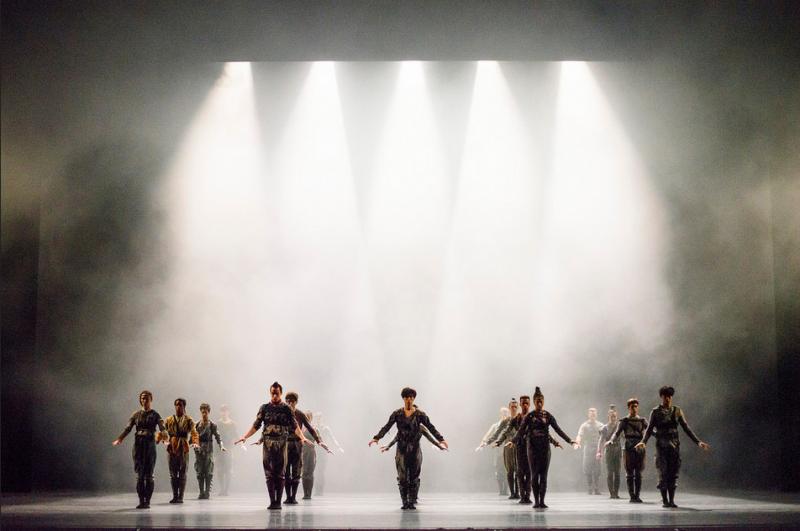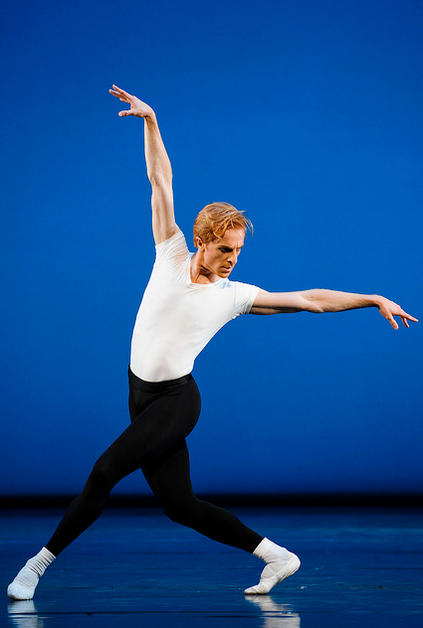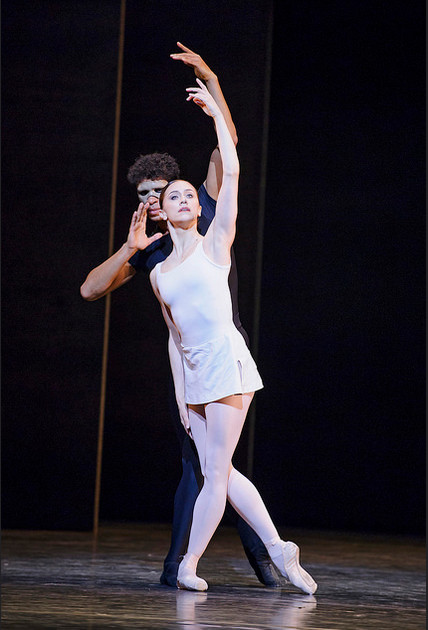The Four Temperaments/Untouchable/Song of the Earth, Royal Ballet | reviews, news & interviews
The Four Temperaments/Untouchable/Song of the Earth, Royal Ballet
The Four Temperaments/Untouchable/Song of the Earth, Royal Ballet
Shechter première odd one out in triple bill with Balanchine and MacMillan

After the second piece of last night's triple bill, Hofesh Shechter's Untouchable in its world premiere, my friend asked me why it had been put on the programme with the first piece, George Balanchines 1946 Four Temperaments. He wondered if there was some structural or thematic connection that he had missed between the two wildly different pieces.
They might have managed that, but it's hardly a resounding ambition for a top international company in one of the world's most dance-literate cities, nor in some ways is it much of a vote of confidence for Shechter in his first commission for the company. He may be a big name with a cult following in the contemporary dance world, but the RB evidently think he's risky enough to need bracketing with two sure-fire box office hits from the back catalogue, however different from him they may be. Unsurprisingly, the resulting evening was, despite much excellent dancing, a mishmash. The Four Temperaments has that classic Balanchine practice clothes look, but unlike the crisply joyous Agon is infused with tortured emotion. Yes, there is a Sanguinic variation (Akane Takada and Federico Bonelli) but what sticks in your mind is the hopeless crumpling in on himself of Melancholic (Steven McRae), the sullenly twisted shoulders of Phlegmatic (Edward Watson), and the uncompromising gaze of Choleric (Zenaida Yanowksy). McRae (pictured right) and Watson in particular were on splendid form, the former precise but transmuting his usual buoyancy into a kind of despairing elasticity, the latter as dangerously elegant as a wounded panther.
The Four Temperaments has that classic Balanchine practice clothes look, but unlike the crisply joyous Agon is infused with tortured emotion. Yes, there is a Sanguinic variation (Akane Takada and Federico Bonelli) but what sticks in your mind is the hopeless crumpling in on himself of Melancholic (Steven McRae), the sullenly twisted shoulders of Phlegmatic (Edward Watson), and the uncompromising gaze of Choleric (Zenaida Yanowksy). McRae (pictured right) and Watson in particular were on splendid form, the former precise but transmuting his usual buoyancy into a kind of despairing elasticity, the latter as dangerously elegant as a wounded panther.
It's odd after Balanchine to have the men more in your mind than the women, given how much Mr B identified ballet with ballerinas, but it's not just a reflection of the current state of the RB principals' roster, where interesting men outnumber interesting women: The Four Temperaments really does give the individual psychological stuff to the men, and has its women appearing mostly in phalanxes, spiky and threatening, slicing the stage up in those typical Balanchine diagonals. As usual when the Royal Ballet does Balanchine, I thought the corps de ballet were looking a bit tame, commendably technically secure, but not attacking enough to really pull them off balance and make it thrilling (honourable mention to Yasmini Naghdi for risking it more than most), but it was a fine performance nevertheless, its Hindemith score ably if not inspiringly played by Robert Clark and the Royal Ballet orchestra.
Hofesh Shechter may be an emigré like Balanchine, but otherwise they're about as different as possible. Something of a creative polymath who writes his own music as well as choreographing, Shechter creates dance of wonderful fluidity, a kind of elemental movement language, which he tends to pair with loud music, shock tactics of one sort or another (removing the seats at Sadler's Wells, confessing his adultery on stage), and a desire to get under the audience's skin. Given the resources of the Royal Ballet to play with, I was expecting him to come up with something really huge, maybe shaking the house with bass like Carbon Life did three years ago.
 But whether the space swallowed the impact or whether he has deliberately gone for a muted effect, Untouchable was much quieter than his other pieces. Twenty young dancers in makeshift combat clothes pulse and move mostly as one, alternating between crisply upright marching and Shechter's trademark simian chaos, over a score of low strings and gently throbbing percussion (enlivened at one point by the words "Nigel Farage" sung like a Muslim call to prayer). It's hypnotic, beautiful and compelling - for the first ten minutes. Some of the remaining 20 minutes I spent trying to figure out the link with contemporary young radical paramilitary fighters that the costumes suggest, but it's an elusive one, something about youth and the desire to belong perhaps. By the end I was something I've never been in a Shechter piece before: bored.
But whether the space swallowed the impact or whether he has deliberately gone for a muted effect, Untouchable was much quieter than his other pieces. Twenty young dancers in makeshift combat clothes pulse and move mostly as one, alternating between crisply upright marching and Shechter's trademark simian chaos, over a score of low strings and gently throbbing percussion (enlivened at one point by the words "Nigel Farage" sung like a Muslim call to prayer). It's hypnotic, beautiful and compelling - for the first ten minutes. Some of the remaining 20 minutes I spent trying to figure out the link with contemporary young radical paramilitary fighters that the costumes suggest, but it's an elusive one, something about youth and the desire to belong perhaps. By the end I was something I've never been in a Shechter piece before: bored.
Song of the Earth is one of MacMillan's greatest pieces, a meditation on life and death set to a Mahler song cycle and in my opinion always worth catching when it's on (as it is twice this season, in fact). Though 65 minutes is a long haul for the last piece on a triple bill, it was a treat to see in the hands of a splendid cast: Carlos Acosta as the Messenger of Death and Marianela Nuñez and Thiago Soares as the couple separated by him. Tender, characterful dancers all, Nuñez (pictured above right with Acosta) in particular was profoundly affecting as the Woman, gradually coming to realise the full magnitude of the emptiness left by death, and at the same time to find some peace in accepting it. Other notable performances came from mezzo-soprano Catherine Wyn-Rogers and First Soloist Yuhui Choe, who sparkled in the third song, light as a mayfly, but the ensemble as a whole was on very fine form indeed.
Those who will love all three pieces on this bill equally will be few in number, I'd wager. But there's plenty in it of interest, and plenty of excellent dancing from the Royal Ballet. Fans of Balanchine, Shechter or MacMillan will be definitely rewarded by their own piece - and who knows? - may also discover something new.
- This triple bill is on at the Royal Opera House until 14 April. Song of the Earth returns in May on a bill with In the Night and Afternoon of a Faun.
rating
Explore topics
Share this article
Add comment
The future of Arts Journalism
You can stop theartsdesk.com closing!
We urgently need financing to survive. Our fundraising drive has thus far raised £49,000 but we need to reach £100,000 or we will be forced to close. Please contribute here: https://gofund.me/c3f6033d
And if you can forward this information to anyone who might assist, we’d be grateful.

Subscribe to theartsdesk.com
Thank you for continuing to read our work on theartsdesk.com. For unlimited access to every article in its entirety, including our archive of more than 15,000 pieces, we're asking for £5 per month or £40 per year. We feel it's a very good deal, and hope you do too.
To take a subscription now simply click here.
And if you're looking for that extra gift for a friend or family member, why not treat them to a theartsdesk.com gift subscription?
more Dance
 'We are bowled over!' Thank you for your messages of love and support
Much-appreciated words of commendation from readers and the cultural community
'We are bowled over!' Thank you for your messages of love and support
Much-appreciated words of commendation from readers and the cultural community
 R:Evolution, English National Ballet, Sadler's Wells review - a vibrant survey of ballet in four acts
ENB set the bar high with this mixed bill, but they meet its challenges thrillingly
R:Evolution, English National Ballet, Sadler's Wells review - a vibrant survey of ballet in four acts
ENB set the bar high with this mixed bill, but they meet its challenges thrillingly
 Like Water for Chocolate, Royal Ballet review - splendid dancing and sets, but there's too much plot
Christopher Wheeldon's version looks great but is too muddling to connect with fully
Like Water for Chocolate, Royal Ballet review - splendid dancing and sets, but there's too much plot
Christopher Wheeldon's version looks great but is too muddling to connect with fully
 iD-Reloaded, Cirque Éloize, Marlowe Theatre, Canterbury review - attitude, energy and invention
A riotous blend of urban dance music, hip hop and contemporary circus
iD-Reloaded, Cirque Éloize, Marlowe Theatre, Canterbury review - attitude, energy and invention
A riotous blend of urban dance music, hip hop and contemporary circus
 How to be a Dancer in 72,000 Easy Lessons, Teaċ Daṁsa review - a riveting account of a life in dance
Michael Keegan-Dolan's unique hybrid of physical theatre and comic monologue
How to be a Dancer in 72,000 Easy Lessons, Teaċ Daṁsa review - a riveting account of a life in dance
Michael Keegan-Dolan's unique hybrid of physical theatre and comic monologue
 A Single Man, Linbury Theatre review - an anatomy of melancholy, with breaks in the clouds
Ed Watson and Jonathan Goddard are extraordinary in Jonathan Watkins' dance theatre adaptation of Isherwood's novel
A Single Man, Linbury Theatre review - an anatomy of melancholy, with breaks in the clouds
Ed Watson and Jonathan Goddard are extraordinary in Jonathan Watkins' dance theatre adaptation of Isherwood's novel
 Peaky Blinders: The Redemption of Thomas Shelby, Rambert, Sadler's Wells review - exciting dancing, if you can see it
Six TV series reduced to 100 minutes' dance time doesn't quite compute
Peaky Blinders: The Redemption of Thomas Shelby, Rambert, Sadler's Wells review - exciting dancing, if you can see it
Six TV series reduced to 100 minutes' dance time doesn't quite compute
 Giselle, National Ballet of Japan review - return of a classic, refreshed and impeccably danced
First visit by Miyako Yoshida's company leaves you wanting more
Giselle, National Ballet of Japan review - return of a classic, refreshed and impeccably danced
First visit by Miyako Yoshida's company leaves you wanting more
 Quadrophenia, Sadler's Wells review - missed opportunity to give new stage life to a Who classic
The brilliant cast need a tighter score and a stronger narrative
Quadrophenia, Sadler's Wells review - missed opportunity to give new stage life to a Who classic
The brilliant cast need a tighter score and a stronger narrative
 The Midnight Bell, Sadler's Wells review - a first reprise for one of Matthew Bourne's most compelling shows to date
The after-hours lives of the sad and lonely are drawn with compassion, originality and skill
The Midnight Bell, Sadler's Wells review - a first reprise for one of Matthew Bourne's most compelling shows to date
The after-hours lives of the sad and lonely are drawn with compassion, originality and skill
 Ballet to Broadway: Wheeldon Works, Royal Ballet review - the impressive range and reach of Christopher Wheeldon's craft
The title says it: as dancemaker, as creative magnet, the man clearly works his socks off
Ballet to Broadway: Wheeldon Works, Royal Ballet review - the impressive range and reach of Christopher Wheeldon's craft
The title says it: as dancemaker, as creative magnet, the man clearly works his socks off
 The Forsythe Programme, English National Ballet review - brains, beauty and bravura
Once again the veteran choreographer and maverick William Forsythe raises ENB's game
The Forsythe Programme, English National Ballet review - brains, beauty and bravura
Once again the veteran choreographer and maverick William Forsythe raises ENB's game

Comments
Watched opening night
Watched the opening and
Thanks for your comments
Thanks for your comments Donna and Kristina - it's interesting how the Hofesh piece drew such mixed reactions. I have heard others as enthusiastic as yours, but there were also plenty of people around me in the audience who were clearly underwhelmed. I wonder if it made a difference where you were sitting - I was quite far round the side of the auditorium, and it may well have had a far greater impact if seen full-on from the front.
Hofesh shows choreographers